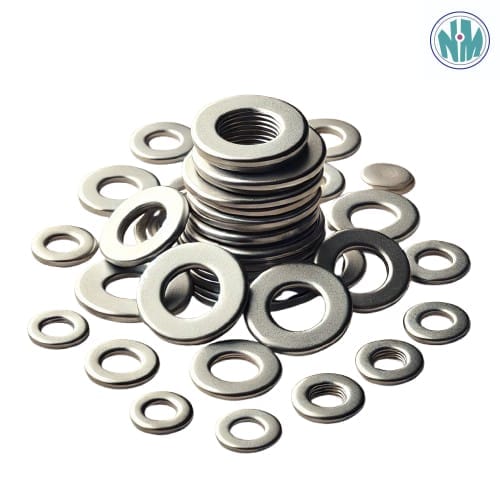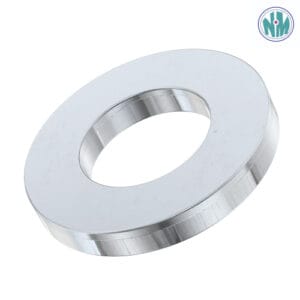No products in the cart.
The Ultimate Guide to Plain Washers: Dimensions, Uses, Types & More
When delving into the world of fasteners, plain washers manufacturers often take center stage as unassuming yet critical components. Whether you’re assembling machinery, securing structural frameworks, or crafting delicate electronics, plain washers ensure functionality and durability. This comprehensive guide explores every facet of plain washers manufacturers, from their dimensions to their myriad uses of and types.
What Is a Plain Washers?
M3 Plain washers – Mild Steel washers
M4 Plain washers – Mild Steel
M5 Plain washers – Mild Steel
M6 Plain washers – Mild Steel
M8 Plain washers – Mild Steel
M10 Plain washers – Mild Steel
M12 Plain washers – Mild Steel
M14 Plain washers – Mild Steel
Key Functions of Plain Washers
Load Distribution: Prevents localized stress and damage to the material being fastened.
Surface Protection: Shields the surface from scratches or indentations caused by bolts or nuts.
Vibration Dampening: Reduces loosening caused by vibrations.
Improved Fastening: Enhances the stability of the connection.
Types of Plain Washers
While plain washers are generally classified as flat washers, they can vary based on material, finish, and specific applications. Here are the most common types:
Standard Flat Washers: The most basic type, used in general-purpose applications.
Fender Washers: Feature a larger outer diameter for better load distribution.
Metric Washers: Designed to comply with metric system standards.
Sealing Washers: Made of rubber or other soft materials to provide a watertight seal.
High-Strength Washers: Manufactured from hardened steel for heavy-duty applications.
Materials Used in Plain Washers
Plain washers are available in a wide range of materials, each suited for specific conditions:
Stainless Steel: Resistant to corrosion, ideal for outdoor and marine environments.
Carbon Steel: Offers high strength and durability.
Brass: Non-magnetic and corrosion-resistant, often used in electrical and decorative applications.
Aluminum: Lightweight and corrosion-resistant, suitable for aerospace and automotive use.
Copper: Excellent conductivity, widely used in electrical and thermal applications.
Titanium: Lightweight yet highly durable, ideal for aerospace and medical equipment.
Phosphor Bronze: Combines good corrosion resistance with excellent wear properties, often used in marine and industrial environments.
Plastic or Nylon: Non-conductive and lightweight, perfect for electronics and lightweight assemblies.
Inconel: A high-performance alloy used in extreme environments, such as aerospace and chemical processing.
Zinc-Coated Steel: Combines the strength of steel with corrosion resistance provided by a zinc coating.
Hardened Steel: For heavy-duty applications requiring high tensile strength.
Mild Steel: Economical and suitable for general-purpose applications.
Nickel Alloys: Ideal for high-temperature and corrosive environments, such as chemical processing.
Lead-Coated Steel: Used in environments requiring radiation shielding or extra corrosion resistance.
Glass-Filled Nylon: Adds rigidity to nylon washers for greater strength in specialized applications.
Note: The choice of material depends on the application environment, load requirements, and potential exposure to corrosive elements.
Applications of Plain Washers
Plain washers are versatile components used across numerous industries. Here are some notable applications:
Construction: To secure bolts and prevent damage to structural materials.
Automotive: For distributing loads and minimizing vibrations in vehicles.
Electronics: To insulate and protect delicate components.
Aerospace: Lightweight and high-strength washers ensure stability in critical applications.
Household: Used in furniture assembly and various DIY projects.
Oil and Gas: High-performance materials like Inconel are used in washers for pipelines and rigs.
Renewable Energy: Washers play a key role in wind turbine assemblies and solar panel installations.
Medical Equipment: Titanium washers are used for their biocompatibility and strength in medical devices.
Marine Applications: Phosphor bronze or stainless steel washers resist saltwater corrosion.
Heavy Machinery: Hardened steel washers withstand the significant loads and stresses of industrial machines.
Power Generation: Washers play a vital role in assembling turbines and generators.
Defense: High-performance washers are used in defense systems, including vehicles and artillery.
How to Choose the Right Plain Washers
Selecting the correct washer involves considering multiple factors:
Bolt or Screw Size: Ensure compatibility with the fastener’s diameter.
Material and Finish: Match the washer material to the application environment.
Load Requirements: Choose a washer with adequate thickness and strength.
Corrosion Resistance: Opt for stainless steel or coated washers for outdoor use.
Standards Compliance: Verify that the plain washers amnufacturers meets required standards like ISO or DIN.
Plain washers manufacturers
Advantages of Using Plain Washers
Prevents fastener loosening over time.
Reduces wear and tear on fastened materials.
Protects surfaces from permanent damage.
Simplifies maintenance and assembly processes.
Plain washers manufacturers
Innovative Uses of Plain Washers
Craft Projects: Plain washers can be painted and used as decorative elements.
Weight Calibration: Precision washers are used in scales and measuring devices.
Spacer Solutions: Serve as spacers in mechanical assemblies to adjust height or alignment.
Electrical Grounding: Copper washers ensure efficient grounding in electrical systems.
Thermal Insulation: Plastic washers prevent heat transfer between components.
Scientific Equipment: Precision washers are used in sensitive instruments to ensure accuracy.
Art Installations: Large washers can be creatively repurposed for sculptures and industrial art.
Environmental Monitoring: Washers in specialized alloys are used in monitoring devices for extreme environments.
Plain washers manufacturers
Plain Washer Standards and Markings
Leading organizations, such as ISO and DIN, set standards to ensure uniformity in washer design. Common standards include:
ISO 7089: General-purpose flat washers for metric bolts.
DIN 125: Flat washers with specific tolerances and dimensions.
ASME B18.22.1: Covers dimensions for flat washers in inch-based systems.
Why Choose the Best Plain Washers Manufacturer?
When sourcing washers, partnering with the best plain washers manufacturer ensures superior quality, precision, and reliability. Top manufacturers adhere to international standards and use advanced manufacturing techniques to deliver high-quality washers tailored to specific needs. Whether you’re looking for plain washers, fender washers, or the best stainless steel (SS) washers, choosing a trusted supplier guarantees durability and performance.
Plain washers manufacturers
Nafees Metal Industries: Your Trusted Partner for the Best Washers
As one of the best plain washers manufacturers in the industry, Nafees Metal Industries specializes in producing high-quality plain washers, stainless steel washers, and custom-designed solutions for diverse industries. With state-of-the-art power press machines and a commitment to precision, we provide washers that meet stringent quality standards and excel in performance.
Why Choose Us?
Comprehensive Range: From plain washers to disc spring washers, we cater to all your requirements.
Premium Materials: Our washers are made from top-grade materials, including stainless steel and carbon steel.
Customization: Tailored solutions to match your specific application needs.
Global Reach: We supply to industries worldwide, ensuring timely delivery and competitive pricing.
ISO Compliance: All our products meet international standards, ensuring reliability and safety.
Maintenance Tips for Plain Washers
Lubrication: Use appropriate lubricants to reduce friction and prevent corrosion.
Replacement: Replace damaged or corroded washers promptly to maintain the integrity of the assembly.
Storage: Store washers in a dry, temperature-controlled environment to avoid rust or material degradation.
Tags: plain washers
Related posts
What is the difference between plain washers, machined washers and flat washers? Washers are often used interchangeably, but they have slight differences. Plain washers are... Continue reading








Leave a reply